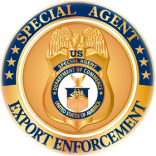
FOR IMMEDIATE RELEASE |
Departments of Justice, Commerce, and Treasury Issue Joint Advisory on Compliance of Foreign-Based Persons with Sanctions and Export Laws
WASHINGTON — The Department of Justice, Department of Commerce’s Bureau of Industry and Security (BIS), and the Department of the Treasury’s Office of Foreign Assets Control (OFAC) today issued a joint compliance note focusing on the obligations foreign-based individuals and entities have to comply with U.S. sanctions and export control laws and the risks of exposure that they face for non-compliance. Today’s note marks the third collective effort by the three agencies to inform the private sector about enforcement trends and provide guidance to the business community on compliance with U.S. sanctions and export laws. All three agencies also joined three other multi-seal advisories in the past year.
“Any person or company participating in the global marketplace has an obligation to comply with our sanctions and export control laws, regardless of where they are located,” said Assistant Attorney General for National Security Matthew G. Olsen. “Today’s advisory makes clear that the global business community must ensure that they are educated about how these laws apply and take steps to mitigate any risks they may face as a result of their business operations.”
“As today’s compliance note makes clear, it doesn’t matter where in the world you’re located—if you’re dealing in items subject to the EAR, you must comply with U.S. export controls,” said Matthew S. Axelrod, Assistant Secretary of Commerce for Export Enforcement. “Failure to do so may risk you being the subject of an administrative or criminal enforcement action.”
The compliance note highlights the applicability of U.S. sanctions and export control laws to persons and entities located abroad and describes the enforcement mechanisms available to hold violators accountable, including civil enforcement actions and criminal prosecutions. In addition, the note provides an overview of compliance considerations for non-U.S. companies and compliance measures that could potentially help mitigate their risk.
“OFAC will continue to actively enforce our sanctions against those who violate them, whether in the United States or abroad,” said Director Bradley T. Smith of the Department of the Treasury’s Office of Foreign Assets Control. “As underscored by today’s advisory, foreign persons should be vigilant in understanding their OFAC-administered sanctions obligations and take steps necessary to comply.”
As with prior multi-agency advisories, the compliance note underscores the importance of an effective and robust compliance program to mitigate any risks of non-compliance that they may face in today’s global business environment. This is especially true for foreign companies who do business with both the United States and jurisdictions, people, or entities who are subject to restrictions under U.S. sanctions or export control laws.
The full compliance note is available here: link.

